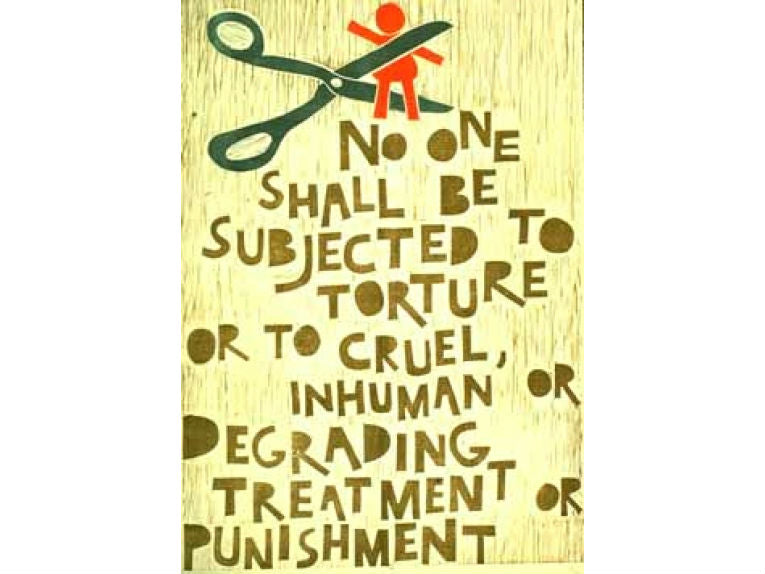Torture is a crime under international law. It denies inherent dignity and seeks to annihilate a victim's personality. The United Nations has always condemned torture as being one of the vilest acts that human beings can perpetrate on each other.
As long ago as 1948 the UN General Assembly adopted the Universal Declaration of Human Rights, which declared that, "No one shall be subjected to torture or to cruel, inhuman or degrading treatment or punishment."
On 26th June 1987 the UN Convention Against Torture and Other Cruel, Inhuman or Degrading Punishment or Torture came into force and since 1998 this date has been commemorated as the International Day in Support of Victims of Torture.
The UN makes it absolutely clear that according to all relevant instruments, torture is absolutely prohibited and cannot be justified under any circumstances. Furthermore, since this prohibition forms part of customary international law, it is binding on every member of the international community, regardless of whether a State has ratified international treaties that expressly prohibit torture.
In spite of what on the face of it is a universal condemnation, torture continues to be tolerated and practiced in many states. Victims continue to suffer and perpetrators enjoy impunity. In fact in the 25 years following the 1987 declaration only 147 of the 189 member states have actually ratified the Convention.
Not only that, but according to Amnesty International a significant number of states that are party to the Convention are not only falling short of their obligation to take the necessary steps to prevent torture, but are going so far as to actually sanction it.
A problem is that although the majority of states in the international community outwardly subscribe to the view that torture is cruel, inhuman and degrading and should be complexly banned, its lack of criminalisation and the inadequacy of sanctions makes it very hard to control.
There have been widely repeated instances where some states have invoked different types of emergency that has led either directly or indirectly to practices such as secret detention, disappearances, expulsion or extradition of individuals to countries where they were in danger of torture and other unlawful treatment or punishment.
Following the 9-11 Outrage in New York in 2001, during the subsequent "War on Terror", the US authorities rounded up large numbers of chiefly Muslim men for interrogation in an effort to track down the perpetrators.
The argument was that extreme circumstances required extreme measures and a number of these prisoners were flown to various locations around the world as part of a process known as extreme rendition. Here they were interrogated, before they ended up in the detention camps at Guantanamo Bay in Cuba, where a significant number remain.
There is intense speculation as to the various techniques that were used to obtain confessions and it is accepted that "waterboarding", a form of simulated downing, was used in a number of cases.
Procedures such as this might be regarded as being a form of torture, while the counter argument is that it was a perfectly legitimate form of interrogation, given the circumstances. The US Government is categorical in its denial that torture is being conducted in the detention camps at Guantanamo Bay.
When Amnesty International conducted a survey in the late 1990s it reported that torture, cruel, inhuman or degrading treatment or punishment was widely practised in more than 150 countries.
The picture has shown little sign of improvement. Amnesty International's 2010 annual report showed that torture and severe beatings still take place in at least 111 countries - more than half of the world's states.
There are reports of prisoners being whipped, kicked or having to endure long periods being tied up in painful positions. In some instances prisoners are kept in tiny crates or in underground cells with no natural light. Some prisoners are left outside for hours in the hot sun, or are locked in shipping containers and forced to endure severe temperature fluctuations. The use of electric shocks during interrogation is far from uncommon.
It is now 64 years since the UN's original Declaration of Human Rights, with its guiding principle that man's humanity to man must be respected. It is sad to reflect that in many instances this is simply being ignored. World leaders should reflect on this.
In his address to mark the 2011 International Day in Support of Victims of Torture, UN Secretary General Ban Ki-moon summed up the continuing struggle.
"Torture and other forms of cruel, degrading and inhuman treatment and punishment, wherever they occur and whatever the circumstances, can never be justified. States must take effective legislative, administrative, judicial or other measures to prevent acts of torture in any territory under their jurisdiction."










